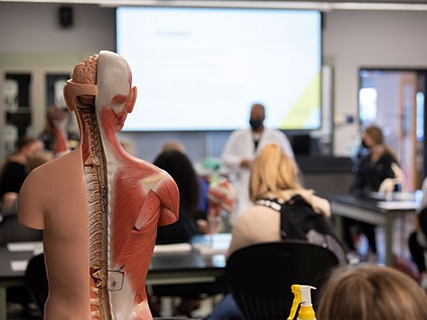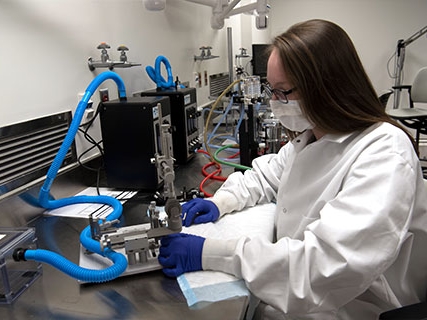Center for Integrative Natural Science and Mathematics (CINSAM)
CINSAM’s mission is to promote enthusiasm, excellence, and equity at pre-school through undergraduate levels by advancing and integrating teaching, learning and scholarship in the science, technology, engineering and mathematics (STEM) disciplines. In addition to working with our regional P-12 schools, CINSAM leads projects where students are involved in STEM research, leadership, and communication opportunities.

Cadaver Laboratory
Students have the profoundly impactful opportunity to learn about the complexity of the human body in our cadaver lab, applying anatomy and physiology concepts they have previously learned in class in a lasting way. Students of different levels in our region can respectfully learn about the body and their interests in medicine in this unique teaching environment.

Interdisciplinary Laboratory Equipment
The Dorothy Westerman Herrmann Science Center and the Health Innovation Center house numerous laboratory spaces with shared scientific equipment including a new Waters Xevo G2-XS QToF Mass Spectrometer with ACQUITY UPLC and Peak Scientific Nitrogen Generator for metabolomics experiments. Other equipment includes a flash chromatograph, a confocal microscope, a gas chromatograph-mass spectrometer, a 500 MHz Fourier Transform NMR (Bruker), and an atomic force microscope. The equipment is utilized by students during independent research with faculty, but also through experiments conducted within laboratory courses.
Neuroscience Research Facility
Neuroscience faculty from departments, including Biological Sciences and Psychological Science, work collaboratively in state-of-the-science laboratory facilities for teaching and research. Studies of the brain and behavior provide new insights into treating drug addiction, the effect of infection and drug use on the developing brain, and the impact of widespread pollutants on brain function. Students are able to discover changes in individual cells, neurotransmitters, hormones, gene expression, and behavior to get a complete picture of how the nervous system responds.
NKU Research and Education Field Station
The Research and Education Field Station (REFS) is a learning center where research, education, and nature merge. Students can participate in regional environmental and ecological research with faculty and professionals in the field during outdoor-oriented courses with access to wetlands, upland old growth forest, meadowlands, streams, and the Ohio River.
The John W. Thieret Herbarium is one of NKU's secret treasures: a library of over 35,000 pressed and dried plant collections. These collections are used for both research and teaching.